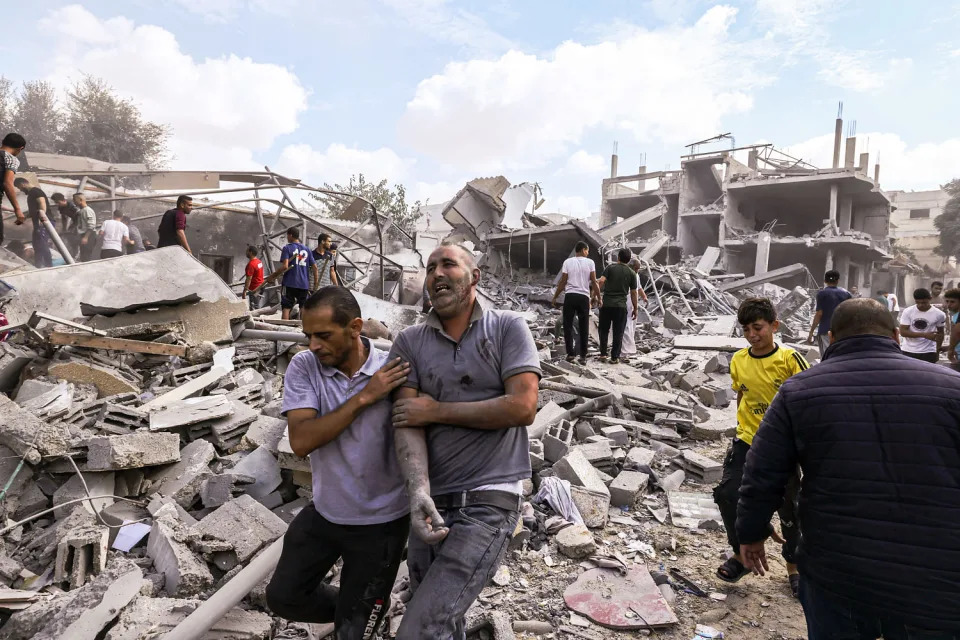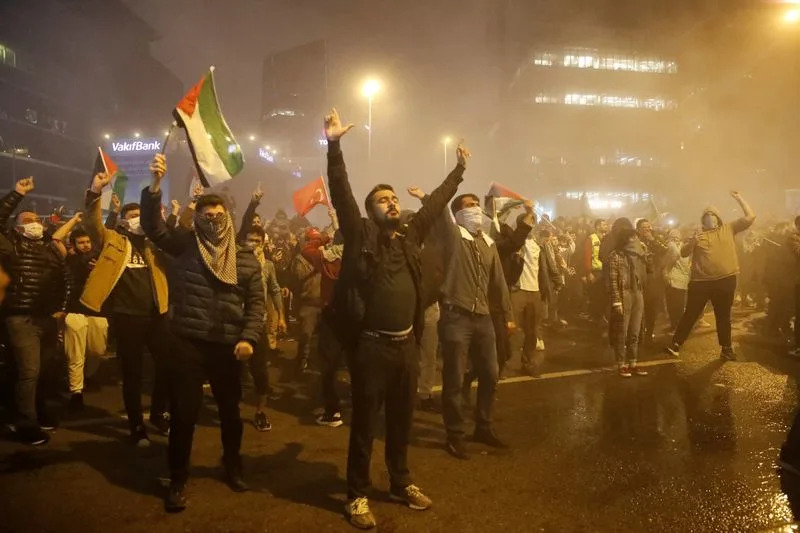Michael Hiltzik
Wed, October 18, 2023

Palestinian supporters demonstrate during a protest at Columbia University in New York on Oct. 12. (Yuki Iwamura/Associted Press)
The announcement by billionaire Leslie Wexner, the former boss of the Limited and Victoria's Secret, that his foundation is cutting its ties with Harvard University over that institution's inadequate response to the Oct. 7 Hamas terror attack in Israel raises a couple of questions.
One is how he would have had the university respond to the attack? The other is why did Harvard continue to accept donations from Wexner, given the billionaire's long relationship with sex trafficker Jeffrey Epstein?
We'll probe the later issue in a moment. But the first question is pertinent to what is emerging as a sort of billionaires' cancel campaign against the Ivy League universities and other institutions that have enjoyed their patronage for about as long as America has had billionaires.
We unequivocally — and emphatically — condemn antisemitism as antithetical to our institutional values. As a university, we also fiercely support the free exchange of ideas as central to our educational mission.
University of Pennsylvania President M. Elizabeth Magill and fellow administrators
This campaign has been prompted by the Hamas attack and the universities' ostensibly incomplete and insufficient position statements about it. The universities are accused of countenancing antisemitic statements by students and faculty in the aftermath of the attack and fostering antisemitic teachings and sentiments on campus even prior to the attack.
In addition to Wexner's announcement, we've had these other manifestations of the billionaire donors' discontent:
—The billionaire Huntsman family, led by Jon Huntsman Jr., a former U.S. ambassador to China, said that it would henceforth "close its checkbook" to the University of Pennsylvania, the beneficiary of tens of millions of dollars of donations from three generations of Huntsmans.
"Moral relativism" has made Penn "almost unrecognizable," Huntsman told Penn President M. Elizabeth Magill in a letter that cited its "silence in the face of reprehensible and historic Hamas evil against the people of Israel."
—Ronald Lauder, heir to the Estée Lauder fortune and president of the World Jewish Congress, also threatened to cut off donations to Penn, of which he is an alumnus, due to in part to its hosting last month of a festival of Palestinian writers that included some who were said to have expressed manifestly antisemitic views.
—Hedge fund billionaire Bill Ackman called on Harvard to disclose the names of members of student organizations that issued a statement asserting that the "apartheid regime" of Israel is "the only one to blame" for the attack. The goal, Ackman tweeted, is to ensure that neither he nor any other CEOs "inadvertently hire any of their members."
Let's make clear here that one cannot describe the Hamas attack as anything other than an indefensibly heinous and monstrous act that exceeds the capacity of words to describe and human intellect to comprehend. "Even in the present state of the world, the murder, wounding, and kidnapping of so many defenseless civilians is shocking in its depravity," wrote Fintan O'Toole of the New York Review of Books.
Looking ahead to the almost inevitable consequences of the attack for the residents of Gaza, O'Toole wrote: "Hamas’s knowing provocation of Israel’s wrath against a Gazan population it cannot then defend shows that it cares as little for its own civilians as it does for the enemy’s."
It's not for us to question the sincerity of the billionaires' objections to the universities' responses to the Hamas attack in particular and to antisemitism more generally.
It would be churlish and inappropriate to doubt the genuineness of their thoughts, statements and emotions, arising as they do when the fog of war in the Mideast and while the shock and inconsolable grief provoked by the Hamas attack makes any sober contemplation of the long history of Israeli-Arab relations impossible.
When the time will come for that to happen, if ever, can't be predicted just now. Past efforts have foundered for many reasons, including the regular outbursts of religious and political violence that have roiled the region.
When I visited Israel in 2000 to report on its burgeoning high-tech industry, the business and political leaders I met spoke with unalloyed optimism, in the wake of the Oslo accords, of the prospects for economic growth that would lift the entire region.
Factories straddled the border with Jordan and Palestinian workers moved almost entirely unmolested to and from jobs in Israeli plants. One entrepreneur I met had received approval from Israel and the Palestinian Authority to build an international industrial park — in Gaza. My sources spoke of the trend toward economic cooperation as irreversible.
Weeks after I returned home, the second intifada erupted in Jerusalem, the West Bank and Gaza. Terrorist attacks took the lives of more than 1,000 Israeli civilians, and the same people I had met in Israel infused with so much cheer and hope messaged me to say that "a line had been crossed" by Palestinians that could never be erased. The dream of international prosperity evaporated.
For all that, even at this unsettled moment we can try to place the billionaires' campaign in context.
Read more: Column: Wall Street Journal tells us to weep for the plight of the very, very rich
We can begin by examining the extraordinary influence on even our richest academic institutions of the donors' outrageous wealth. There is an undeniably performative element in their philanthropy, rewarded with their names on buildings and schools — the Leslie H. Wexner Building at Harvard, the Lauder Institute of Management and International Studies at Penn, for example.
There's the tendency for recipient institutions to whitewash the donors' histories. When the billionaire David H. Koch died in 2019, the Massachusetts Institute of Technology treated his shade to a celebration of his generosity to the university in the fields of cancer research, child care and even basketball. Of his role in suppressing the facts of climate change, fighting access to medical coverage for low-income Americans and undermining the expansion of renewable energy, MIT was completely, utterly silent.
Earlier this year, Harvard's president marked an enormous $300-million donation from hedge fund billionaire Kenneth C. Griffin by treating it as an entirely selfless act of philanthropy. Of Griffin's contribution of $54 million to a fight against an Illinois ballot measure that would have raised the state’s top tax rate on incomes higher than $750,000 to about 8% from 5% — which could have cost Griffin about $50 million a year — not a word. (The measure was defeated.)
Wexner may also have enjoyed a certain amount of solicitude from Harvard associated with his relationship with Epstein. That relationship was close, appeared to have helped Epstein amass a large personal fortune, but was murky in its details and character. (Wexner has denied knowing anything about Epstein's sex trafficking.) But the relationship went unmentioned in Harvard's internal 2020 investigation of its own relationship with Epstein.
The investigation reported that the university had received $9.1 million in gifts from Epstein from 1998 to 2008, ending when Epstein was convicted in Florida for sex crimes in 2008. When the investigation was published, some $201,000 in Epstein gifts remained unspent. The university donated the money to nonprofits supporting the victims of sex trafficking and sexual abuse.
It's also worthwhile to take a closer look at the billionaires' specific complaints.
The statement that Ackman and his fellow Harvard alumni found objectionable — and in many respects, appropriately — was not an official statement of the Harvard administration, but came from a coalition of 27 individual student groups, almost all of them purporting to represent students identifying as members of ethnic groups marginalized or politically targeted in America or worldwide, such as Palestinians, Muslims, Arab women, South Asians and Pakistanis. (Some members of those groups have said since the statement's publication that they didn't know about it in advance and didn't agree with its content.)
Read more: Column: Meta and Twitter show the drawbacks of giving self-satisfied billionaires too much power
Harvard President Claudine Gay issued a statement Oct. 10 disavowing the students' statement — “While our students have the right to speak for themselves, no student group — not even 30 student groups — speaks for Harvard University or its leadership,” she said, adding, "Let there be no doubt that I condemn the terrorist atrocities perpetrated by Hamas. Such inhumanity is abhorrent, whatever one’s individual views of the origins of longstanding conflicts in the region.”
It's appropriate to note here that Harvard, along with other elite universities, has not always held antisemitism at arm's length. Starting around 1910, the universities became concerned that too many Jews were attaining admission — 20% to 30% at Harvard by some reckonings. The universities created admission standards that discriminated subtly against Jews and that in many respects persisted into the 1970s and beyond.
Former New York City Council President Andrew Stein wrote Tuesday (in an op-ed co-written by Harvard law professor emeritus Alan Dershowitz) that when he matriculated at Harvard the institution "discriminated against Jews in the selection of deans and presidents" and "welcomed recruitment on campus by corporations and law firms that openly discriminated against Jews."
Among the particulars at Penn that agitated Huntsman and Lauder was the Palestine Writes Literary Festival held in September and featuring the participation of 120 Palestinian writers. The event was designed, according to its organizers, as a counterweight to "the pervasive exclusion from or tokenization of Palestinian voices in mainstream literary institutions."
It this an appropriate event to be hosted by a major university? Certainly. Was it foreseeable that some of the participants might hold antisemitic views? Indubitably.
Should the university have vetted every participant and all their contributions? That would be plainly impossible, if the event were to be held at all. In any case, Magill and her fellow university administrators issued a statement noting that the institution had not organized the festival and acknowledging concerns that some speakers "have a documented and troubling history of engaging in antisemitism by speaking and acting in ways that denigrate Jewish people."
They also said, "We unequivocally — and emphatically — condemn antisemitism as antithetical to our institutional values. As a university, we also fiercely support the free exchange of ideas as central to our educational mission. This includes the expression of views that are controversial and even those that are incompatible with our institutional values."
The unanswered question in this environment and in the aftermath of the Hamas attack is what role our universities can and must play. It's understandable that alumni, faculty and students demand that these institutions condemn this event through their administrators.
We look up to our academic institutions as repositories of humane values and social norms, which makes their silence appear to be tantamount to complicity in terrorism and murder. But they also function as a public square in which political and social issues must be examined through outreach, insight and objectivity.
Statements condemning the Hamas attack and antisemitism generally, issued in the heat of an atrocity and under the pressure of threats from their richest benefactors, can't avoid looking like pro-forma responses, vacant at their core. One can only hope that when the passage of time allows us to contemplate the reality of Israeli-Palestinian relations, their history, consequences and future from a distance, our universities will have the courage to stand in the forefront of the effort.
Get the latest from Michael Hiltzik
Commentary on economics and more from a Pulitzer Prize winner.
This story originally appeared in Los Angeles Times.





























